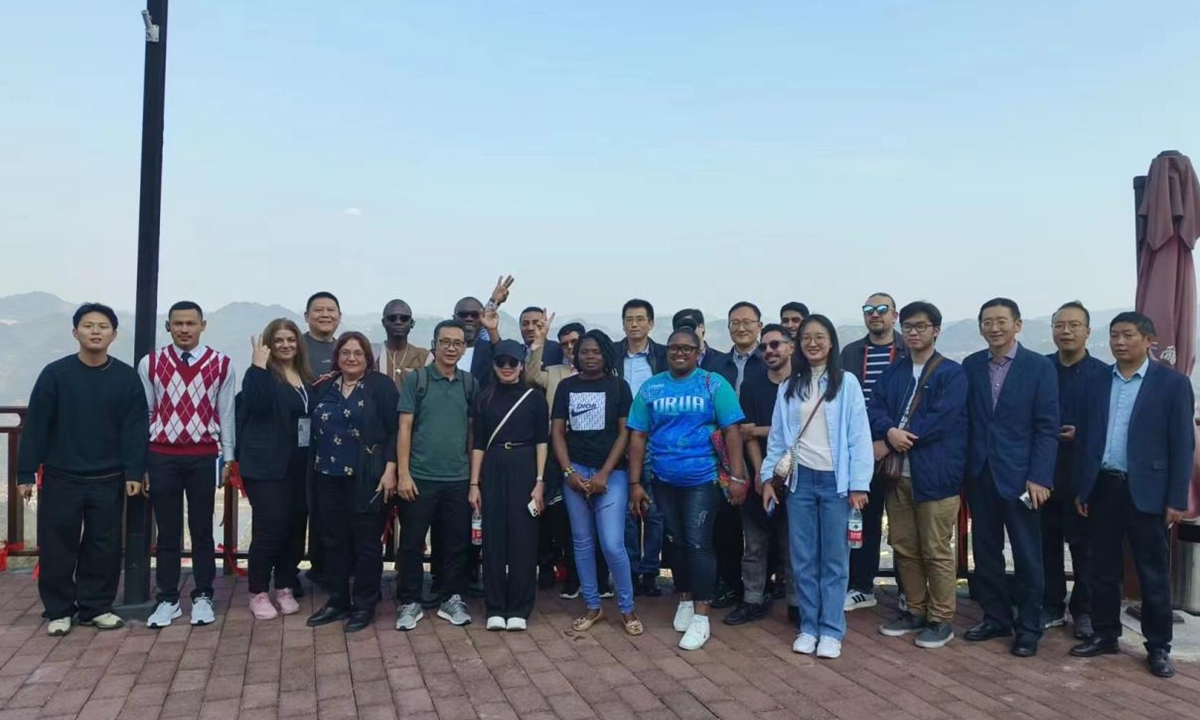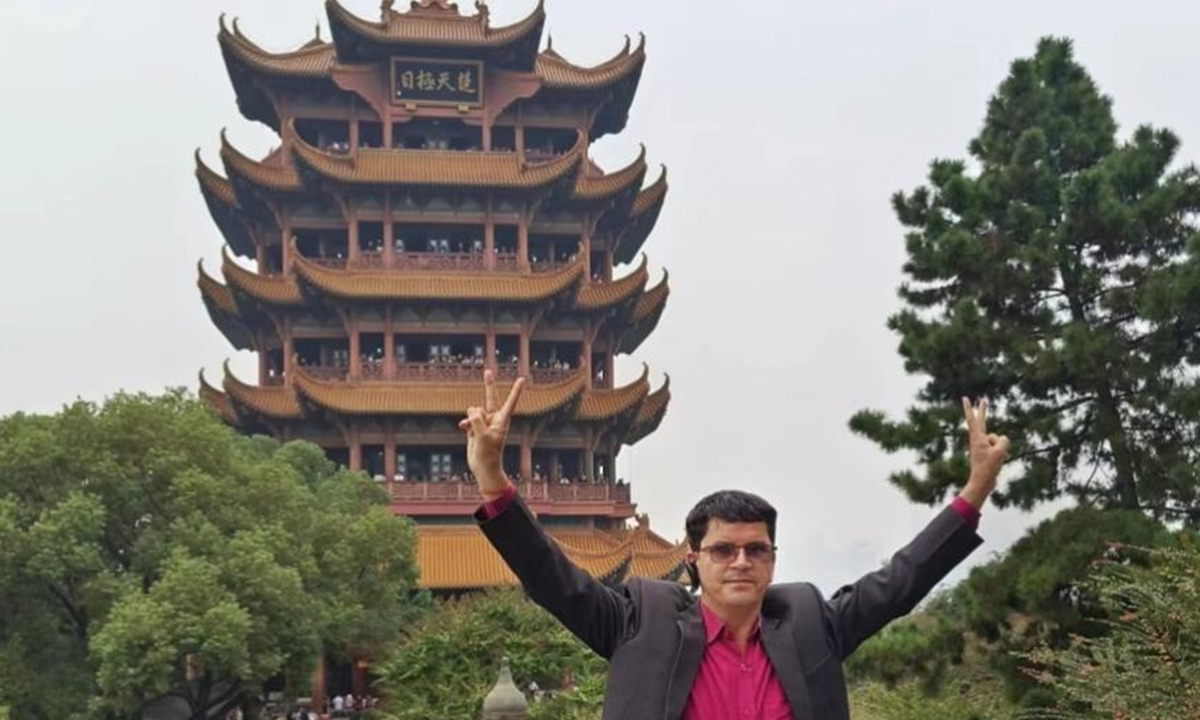ARTS / CULTURE & LEISURE
BRI guests experience charm of China on cultural journey

The 2023 "Belt and Road" Media Cooperation Forum joint interview group visits the Chinese Baijiu Culture Museum in Zunyi, Southwest China's Guizhou Province, on October 23, 2023. Photo: Qian Jiayin/GT
At the Yellow Crane Tower in Wuhan, facing the ever-flowing Yangtze River, Mortada Abdelkhalik Abdelaziz Taha, the manager of Kuwaiti media Alarab, expressed his feelings: "Although I have read a lot of information about China before, this study tour has helped deepen my understanding. When we actually see China, we find that China not only has industry but also tourism, charming natural scenery, and optimistic and hospitable people."
Journalists from Belt and Road Initiative (BRI) participating countries visited the Yuelu Academy, Yellow Crane Tower, and many other Chinese cultural sites from October 20 to 28. China's long history and rich culture have impressed these foreign journalists.
"China is one of the oldest civilizations in the world, and its culture fascinates me," Codjo Amoussou, the director of Benin's public media, La Nation, told the Global Times. During this journey, foreign journalists experienced China's unique liquor culture, academy culture, and even personally experienced traditional Chinese medicine.
"The long story of China is the charm of its culture," Piseth Keo, CEO assistant and editor of Fresh News from Cambodia, told the Global Times. Foreign journalists expressed that the long history of Chinese culture would require a life time of study to fully understand.

The joint interview team of the 2023 "Belt and Road" Media Cooperation Forum visits the Kweichow Moutai Group on October 23, 2023. Photo: Qian Jiayin/GT
Baijiu culture
As the first stop of this cultural journey, foreign journalists visited the Kweichow Moutai Group (Moutai Group), located in Zunyi, Southwest China's Guizhou Province, as well as the Chinese Baijiu Culture Museum. Foreign journalists tasted Moutai liquor and experienced China's unique liquor culture.
Moutai is a traditional Chinese specialty liquor with a history of over 800 years. Moutai is one of the world's three famous distilled liquors, alongside Scotch whisky and French Cognac brandy.
The foreign journalists visited the Moutai production and packaging plant, which made a deep impression on them. Schella Claudicia Yemes, a journalist from La Radio Centrafrique, Central African Republic, told reporters, "I thought we would see large machines replacing workers because China is more advanced in technology, but no, everything is done manually."
Anahit Sargsyan, an international news editor at information-analytic Agency NEWS.am, told the Global Times that she didn't know much about Chinese liquor before coming to China.
"I only knew about Chinese liquor from the movie Red Sorghum, but I didn't know that its production has reached such a scale." Sargsyan said.
"The ancient Chinese brewing tradition and the complexity of the Moutai brewing process left a deep impression on me."
Codjo Amoussou, the director of Benin's public media La Nation, told the Global Times that Maotai Town was his favorite city on the trip so far, as it preserves traditional culture and is filled with joyful people.

Foreign journalists take photos in front of the Yellow Crane Tower on October 27, 2023. Photo: Qian Jiayin/GT
Ancient academy
The foreign journalists also visited the Yuelu Academy located in Changsha, Central China's Hunan Province. One of the "Four Great Academies" of ancient China, it is located on the west bank of the Xiangjiang River and at the foot of Mount Yuelu. This academy is now a secondary college of Hunan University.
Introducing the history of the academy to the journalists, the guide said this ancient school was established in 976 during the Northern Song Dynasty (960-1127) and grew to fame during the Southern Song Dynasty (1127-1279). The renowned Confucian philosopher Zhu Xi came to this academy and held the first academy lecture with Zhang Shi, who was in charge of teaching at the Yuelu Academy at that time.
Standing in front of the academy gate, foreign journalists from the joint interview team listened attentively to the explanations, occasionally asking questions of the guide to gain a detailed understanding of the academy's history.
From the ancient Yuelu Academy to the present-day Hunan University, the spirit of practicality, openness, and freedom in academic research has been passed down through the generations. "China's educational tradition is rigorous and scientific, and it has cultivated many outstanding talents," said Nelli Margaryan, deputy editor-in-chief from Armenpress in Armenia.
Yellow Crane Tower
The Yellow Crane Tower, located in Wuhan, Central China's Hubei Province, sits on the banks of the Yangtze River and has a history spanning over 1,000 years. Climbing up the Yellow Crane Tower, one can see the scenery of white clouds lingering and overlooking the never-ending flow of the Yangtze River.
Mortada Abdelkhalik Abdelaziz Taha told reporters, "I cannot express my special interest in visiting the city of Wuhan. Since I was a child, I knew it was a city of art, poetry, ideas, and science. It has many innovative engineering designs, tourist attractions, and stands witnesses to the development of art, civilization, and history."
Foreign journalists climbed the Yellow Crane Tower to enjoy the breathtaking view of the Yangtze River and the three towns of Wuhan.
"This trip has given me a better understanding of China. There is so much culture and so many uniquely designed buildings. I have learned a lot from books and the fascinating stories of Chinese culture, and I believe there is still much more for me to learn," Amoussou said.

